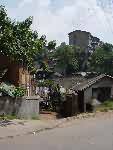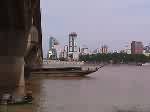- Getting around Lijiang. Dont stay in the Old Towns more than 2 days, there is nothing to do. KRISS Oct 9, 2013 05:46
- 2013 Beijing Temple Fair BENNYLAU Feb 26, 2013 03:29
- Malaysian traveling from KUL - LAX vis Shanghai PVG ZATI_DY Jan 3, 2013 20:15
Before Recorded Time in Hunan
- Views: 4348
- |Vote: 0 0
- |Add to Favorites
- |Recommend to Friends
The Stories of the Earth
Our history, as we understand it, is far too simple. We look back and think in terms of countries and empires, and tell the stories of our people in the characters of kings and emperors. Our museums enshroud the past with their displays - fragments of the property of those few olden ones who were counted as rich amongst the billions of paupers whose belongings and whose bones have long since dissolved into the soil. The textbooks are fairytales of imagined glory, dynasties, philosophers, men of power, the bearers of swords and clubs. They reach weakly into the dim and scratch at the remains of a mere ten thousand years – failing to conceive that, according to current theory, our race has walked these lands for an entire four million years, plodding hopelessly about the fauna and muck and empty grounds of future cities, stripping clothes and meat from the carcasses of beasts, breeding and dying irreligiously with nothing of the tribe or country or order we like to pretend existed in these chronicles of our origins.
I have a map on my bedroom wall that stamps the shape of China on the landscape, and I believe in it, I trace with my finger the borders of provinces that I know do not exist on the ground where there are no lines that divide man from fellow man. The borders of China, and of any country, are just political notions that give indistinct shape to regions of culture. They are created, in part, to mark boundaries for the stories we collect about those cultures to fill out the details of the histories we tell. Those of us who have begun a vague investigation into China's past recognise very early on that recorded Chinese history is far too immense for any single enquirer to comprehend; unrecorded Chinese history is a creature of another scale again, beyond the imagination of gods.
In Changsha, the capital of the province that on the map bears resemblance to the head of a maiden, I had a most uncommon sensitivity to this untold history of our kind. Perhaps it's because Changsha is the focal point of Twentieth Century civil unrest in China, where those assemblies of peasantry of the type who have always disappeared unwritten into the historical analogues, under the inspiration of the Great Helmsman Mao Zedong, made their rush for justice and initiated a zeal for collective power that would overcome the nation. In Changsha, it is the common people who now fix the markers of history; it is one of the few cities in the world where the quiet confidence of the everyman is overwhelming, where one might almost believe that the will of the people could command a free world.
In the Air
Changsha is a provincial capital that is engulfed with the earthy perfumes of the organic and fertile farmlands and jungle that surround and pierce it. The city is, in the suburbs, uncompromisingly green, particularly so in the sauna-like summer months when the branches of brush and vine thrust out their dark green leaves menacingly, as if to remind us that our civilisation is but a temporary imposition on their domain. When I finally had arrived in the city I had been travelling on an awkward side-route around the country to reach, I was deeply impressed with this raw tangle of the organism of the place, a confrontation of concrete and foliage and the inaudible footfall of a billion crawling hot insects in its dark hidden places.
Nowhere in the city is this more obvious than on Orange Island, the elongated sandbar in the middle of the Xiang River that gives the city its name – Changsha translates quite literally as 'long sand'. A hundred years ago, the foreign traders who'd set up in Hunan collected there to protect themselves from the forces of peasant unrest that had begun to ignite in the capital, and built their customary mansions in which to dwell in their opulent delusions of privilege and separation from the human brethren they saw as savages. Escalating conflicts eventually evicted them all, and their old homes are now overcome by the trees or divided up into makeshift apartments for resident squatters. Walking down the boulevard in the afternoon sun, the swelter of warm air above the river making the images of the city's now numerous skyscrapers shimmer like a mirage, I felt as if I was much farther south than I actually was, for the ostentatious facades of the old colonial homesteads, the almost tropical greenery overhanging the stone pathways and the long, hazy line of the river in the heat seemed to come straight out of Southeast Asia – I recalled the ruins of European manors along the beach front in Malaysia's Penang Island, the mazeways of Thailand's Pattaya. Changsha is probably the northernmost city that holds some of those characteristics of the Southeast Asian region – evidence again that the cultures that span the territory of the PRC are a spectrum that intermingle over its borders and continue to influence each other to the present day.
People of the Land
My old friend Lao Hei, whom I had come to see before he left China to marry a Hunanese girl, had lived in the area for more than a year and had become accustomed to the energy of China's reddest province – politically the most sincere to the Communist ideology and culturally every bit as spicy as neighbouring Sichuan. Finally reunited with this fellow traveller and oldest comrade, we feasted together on Changsha's fare of unconscionably hot chillies and saucy hotpots, wandered warm back roads where real Changsha culture performs its gradual dramas through the daily lives of its one and a half million inhabitants, watched the procession of the silty Xiang course its way across the city divide and breathed the summery currents of Changsha air, heady in peppers and forest compost and salt. All the trouble in the journey was recompensed in those warm happy Changsha days.
I couldn't see anything that remained of the grander history of Changsha – that which extends beyond the Socialist era and back into dark feudal times and to the unspeakable beyond of precivilisation. The peasant demonstrations saw a lot of the older monuments and buildings destroyed, and modern Changsha is predominantly post-liberation uniform apartments and civil facilities now overshadowed by brand-new towers of Changsha's recent economic wealth. Those stories of old-time Changsha date back to the foundation of China itself, when the Qin forces that unified the country for the very first time toppled the state of Chu which had made Changsha its capital to the South. More recent excavations have uncovered older stories: most gruesomely the discovery of the exceptionally well-preserved body of the Marquess Xin Zui in whose tomb was laid extraordinary silk paintings and philosophical extracts, all of which have survived the 2,200 years laid underground. It's possible to make the short journey from Changsha to the museum in Mawangdui and see the mummy and the remnants of her age, and catch a glimpse of yet one other lost culture of China's vibrant past.
I wasn't there to see those quirks of the ancients that remain and make the past seem like a pageant; I was in Changsha for friendship and to celebrate the choice to live in the real China of the present. It was in Changsha that I spent my happiest night in China, one evening when it was still too hot to sleep, when Lao Hei and I had left his Dongtan home late at night in search of a meal, and took to the winding suburban alleyways under the infrequent light of street lanterns and the shadows of stone towers. Even in the early hours when night is called morning, the warmth of the day's sun was still held in the rock and radiated up from the earth. We were awake and invigorated, and although we were foreigners to Changsha and to China we felt connected to it somehow, for nothing was unfamiliar, the smell of leaf and dust, the slope of the ground beneath our feet, the purposeful movements our fellow night strollers wandering confidently between their homes.
We found an inviting meal after turning several corners in the warren of old lanes about the district: not an overly decorated restaurant interior, but a simple table set out in front of an open garage door steaming with gusts of spicy shallow-fried Xiang cuisine. The table was laid with broad bowls of hot speciality dishes – we shovelled generous helpings of warm rice onto wide plates and selected from the assortments of chillied meats and vegetables, and sat around a short circular table on knee-high stools. The light from the lantern above us was warm enough to feel on the skin, and the steam from our meals drifted across our faces like the warm wind of the day. We rolled up our shirt sleeves and drank cool beer from the bottle, and laughed, and ate and drank open-heartedly, and spoke to each other in Chinese, and shared for a moment that sense of belonging that all Chinese people feel in their hearts, that the land is familiar with them, that all of their history, all that which is written and that which will never be remembered, is not just the fables of the emperors, but something more dynamic that continues along with them, and that their own stories are a part of it. To get a sense of this, as a foreigner, is a true privilege. It is that feeling of being in the right place that keeps me in China.






 Copyright © 1998-2026 All rights reserved.
Copyright © 1998-2026 All rights reserved.